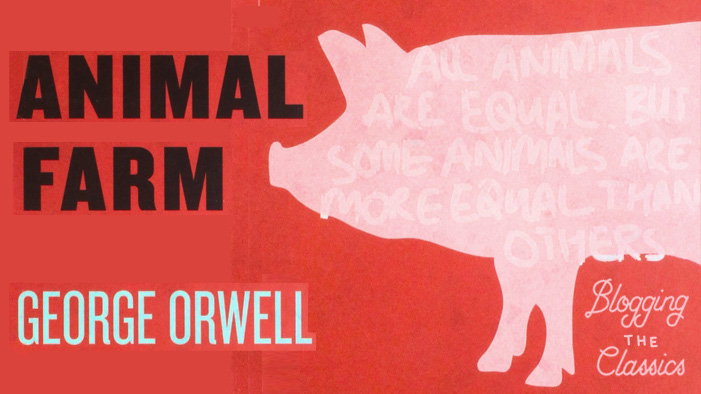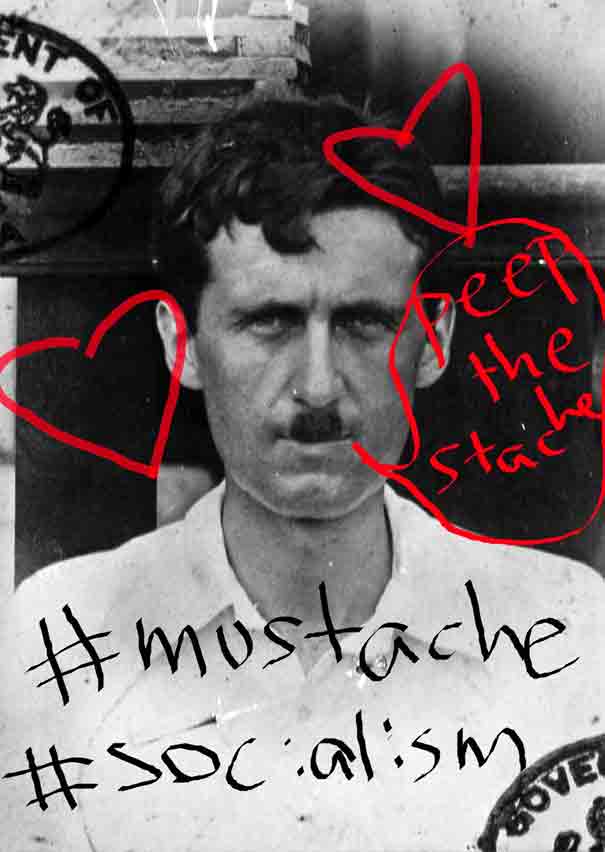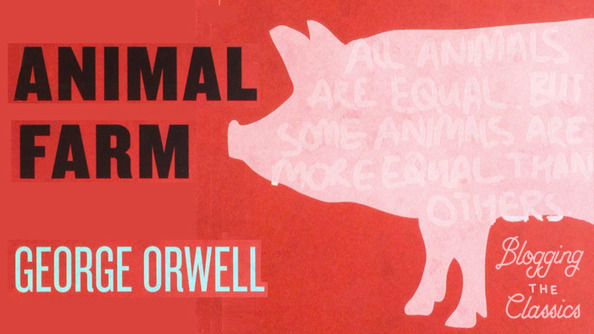Blogging Animal Farm: Chapters 1 & 2

HERE’S THE SITUATION: Last month, we asked you to vote on what book you’d like us to blog this summer in order to make your required reading assignment (and your life) exponentially less awful. Well, the people have spoken, and because this is not (YET) a terrifying, metaphorical farm full of vicious, sentient, Communist animals who brutally suppress the voice of the electorate, we have listened—and thus are bringing you Blogging Animal Farm (the latest entry in our beloved Blogging the Classics series). Every week, we’ll be re-capping George “G-Eazy” Orwell’s anti-fascism dairy-based parable—so if you’re interested in the rise of autocrats, communist state-building, and/or heifers, then take my hand, and off we’ll skip to Manor Farm.
BUT FIRST, a detour. We’re going to begin with a quick biography of George Orwell. Why? A few reasons:
- George Orwell was an absolute boss.
- When reading a book that examines the nature of political-economic systems, it’s helpful to be aware of the author’s own biases.
- For real, Georgie O is a badass. This one time he got shot in the throat.

Background:
First off: you know nothing. George Orwell’s real name was Eric Blair, and he was born in India (his dad was a British civil servant). Surprised? Hold on to your butts, my friends.
At 19, Orwell joins the Imperial Police in India; then, later, Myanmar. The other cops consider him an outsider because he does weird-o nerd things such as: read, write, visit prisoners, learn Burmese, and get some baller knuckle tats like the locals. Sexy rebel Orwell has emerged, mustache and all. He condemns imperialism, and writes one of his most famous essays about this time, “Shooting an Elephant.”
He moves back to merry ol’ England and begins writing about the plight of the poor. He dresses like he’s homeless, takes on a fake name, and lives on and off the streets for research. He’s basically a double agent, like James Bond, except instead of martinis there’s bedbugs. He even deliberately gets arrested so he can spend Christmas in jail. Georgie goes hard.
Orwell lives above a tripe shop; he visits some coal mines; he has all his money stolen. Next he skips off to Spain to join the civil war, fighting against the fascists. He soon gets shot in the throat. Blood pours out of his mouth. Does he die? Almost, but no. The bullet misses an artery by millimeters. Does anybody say ‘thanks’? No—for complicated reasons, he is viewed as a traitor and he has to escape Spain in secret. He goes home to England, adopts a poodle, and names it Marx. I am not making this up.
This war breaks out—we call it World War II, you may have heard of it—but Georgie’s got bad lungs now and he can’t fight. All this time he’s been writing about a bazillion articles, essays, and books. His wife, no kidding, works in the censorship department of the Ministry of Information (hashtag 1984, hashtag real life).
And then—drumroll, please—he writes Animal Farm. Publishers are afraid the book will alienate their allies, the Soviet Union. He keeps trying to get it published, and publishers say: no, no, no, no, no, no, OKAY, FINE. George lives happily ever after.
NEWP. His house gets blown up by a bomb! Dang. He searches through the rubble for his books and carts them off in a wheelbarrow. Then, that one publisher who was going to release Animal Farm? They change their mind after talking to someone at the Ministry of Information (that someone turns out to be a Soviet agent). Next, his wife dies. Honestly, George, what is your life?
At last, in 1945, Animal Farm is published. Let’s pick up there, shall we? The vital points: Orwell was a self-declared democratic socialist, he advocated for the working class, he hated Stalin, he owned a poodle. We’ll check back on G-Money at the end.
CHAPTER 1
(You can read the official SparkNotes Chapter 1 summary right here)
We’re on Manor Farm. The farmer is drunk. The animals are woke AF.
Farmer Jones, the boss, is a wee bit wasted. Once he goes to bed, all the animals get together in the barn to hear a speech by Old Major, the H.P.I.C. (Head Pig in Charge). We get introduced to them as they file in: Boxer and Clover, the hard-working horses; Mollie, your standard ditzy horse; Benjamin, a grumpy donkey; some other animals, I don’t know. What am I, a zookeeper? There’s some dogs, there’s some straw, it’s a barn, you get it. Major then gives a speech, several pages long, that calls for a workers’ revolution.
Major the Pig: I’m old as dirt and going to die soon, so here’s what I know. Our lives are miserable, laborious, and short.
Animals: Yeah!
Major: They don’t have to be short. There’s enough grass and hay for everyone to live long, happy lives. But humans take the eggs from the chickens, the milk from the cows, and the baby horses from the grown-up horses. It’s messed up.
Animals: Yeah!
Major: No animal escapes the cruel knife in the end. You young porkers who are sitting in front of me, you’ll die young, too. We work very hard, but all our work benefits the humans, who sit on their butts like kings while contributing nothing. Whose fault is this? It’s the humans’ fault. Let’s overthrow the human race.
Animals: Yeah!
Me:

Credit: Good at Bizness, Inc.
Overthrow the human race? Are you guys CRAZY?! Who will sell me bagels? Who will star in television shows about space cowboys? This is a ridiculous plan. This book is ridiculous. They make you read this in school? SparkNotes, what are you having me cover, here?
Anyway, the animals plot to destroy all humans, and then they sing a jaunty song.
The animals loves Major the Pig’s idea. They are being taken advantage of by humans, and the whole animal kingdom has to come together to fight and overthrow them. Could this be parallel to the communist idea of overthrowing the rich bourgeoisie? I don’t know, buddy, I just got here and the chickens are singing. The song is called “Beasts of England.” The animals sing the song a few more times and then the Farmer Jones wakes up and shoots at the barn, which is a completely normal way to end parties.
Chapter 2
(You can read the official SparkNotes Chapter 2 summary right here)
Major the Pig dies! PLOT TWIST?!
Major is dead, but the animals are still on this “overthrow all humans” kick. Jerks. The teaching and organizing of the revolution falls to the pigs, because the pigs are the smartest animals. The most popular pigs are Snowball and Napoleon (who—spoiler alert—represent Joseph Stalin and Leon Trotsky). They’re both smooth-talkers and well-liked. Napoleon is extra smooth; he’s the Chris Evans of pigs, except beneath his chest lies not the heart of a hero, but a sinister, unknowable darkness (yikers).
Mollie, the ditzy horse, asks if there will be sugar in the glorious animal-controlled future. Snowball says no. Mollie asks if there will be ribbons. Snowball says no, but there will be freedom. Mollie remains unconvinced. I suspect there will be some trouble for Mollie.
All this time, Farmer Jones is drunk and doing a lousy job of running the place. One day, he goes on a rager and forgets to feed the animals. The animals break into the store-shed to get some dinner, and when Farmer Jones and his Farmer Buddies show up with whips, all the animals turn on them.
The farmers freak out and run away. The animals now control the farm—the Revolution is already successful!
Cue joy. The animals burn all the knives and whips and reins and chains. They skip around happily. They enter the farmhouse and are rattled by how luxurious it is. They decide to keep it as a museum, and agree that no animal must ever live there.
I get this feeling that every time they say “an animal must never…” what Orwell means is, “somebody is definitely, definitely going to do this later.”
Next the pigs, who have taught themselves to read and write, paint Seven Commandments on the side of the barn. Basically they say that humans are the enemy, all animals are friends and equals, and animals shouldn’t get drunk or wear clothes.
This is still a farm, of course, and they all now must go harvest they hay. Before they go, the cows need to be milked. They aren’t sure what to do with that delicious milk, but Napoleon, our new H.P.I.C., tells his comrades to be chill and go harvest while he protects the milk. Later they come back and all the milk is gone. PLOT TWIST?!
Thanks for sticking with me while I fan-girl over Georgeous Orwell. Tune in next time to find out what happens in this feel-good book about magical disappearing dairy products, and the animals who love them.
We’ve also blogged Hamlet, 1984, The Crucible, Lord of the Flies, The Great Gatsby, and about 10 million other books you’ll probs have to read for English class—you can see every blog series right here!













